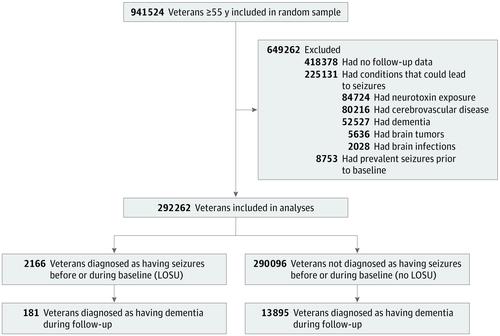JAMA Neurology ( IF 29.0 ) Pub Date : 2020-06-01 , DOI: 10.1001/jamaneurol.2020.0187 Ophir Keret 1 , Tina D Hoang 2, 3 , Feng Xia 2, 3 , Howard J Rosen 1, 4 , Kristine Yaffe 1, 2, 3, 4, 5, 6

|
Importance The incidence of unprovoked seizures and epilepsy increases considerably in late life, with approximately one-third of seizures being of unknown etiology. While individuals with dementia have a high risk of developing unprovoked seizures, it is unknown whether older adults with late-onset unprovoked seizures of unknown etiology (LOSU) are at risk of developing dementia.
Objective To determine whether incident LOSU is associated with a higher risk of dementia among older US veterans.
Design, Setting, and Participants This retrospective multicenter cohort study was conducted using data from US Veterans Health Administration medical centers from October 2001 to September 2015. Data were generated from all veteran inpatient and outpatient encounters that occurred within Veterans Health Administration facilities. A random sample of 941 524 veterans 55 years and older was generated. A total of 649 262 veterans previously diagnosed (using International Classification of Diseases, Ninth Revision, Clinical Modification codes) with dementia, unprovoked seizures, epilepsy, and conditions that could lead to seizures (brain tumors, trauma, infections, stroke, and neurotoxin exposure) as well as veterans without follow-up data were excluded. Data were analyzed from October 2018 to July 2019.
Exposures Late-onset unprovoked seizures of unknown etiology were defined as a new diagnosis of epilepsy or unprovoked seizures without a diagnosis of a secondary cause for seizures. Incident LOSU was assessed during a 5-year baseline period.
Main Outcomes and Measures Veterans were assessed for incident dementia diagnosis during an outcome period. Fine-Gray proportional hazards models were used to determine whether LOSU was associated with greater risk of incident dementia. Models were adjusted for demographic variables, cardiovascular risk factors, depression, and traumatic brain injury.
Results Of the 292 262 included veterans, 282 628 (96.7%) were male, and the mean (SD) age was 73.0 [8.8] years. During the baseline period, 2166 veterans developed LOSU. The mean (SD) follow-up after LOSU was 6.1 (2.9) years. After multivariable adjustment, veterans with LOSU had greater risk of dementia compared with veterans without seizures (hazard ratio, 1.89; 95% CI, 1.62-2.20). A sensitivity analysis imposing a 2-year lag between incident LOSU and dementia diagnosis led to similar results.
Conclusions and Relevance These findings suggest LOSU in older veterans is associated with a 2-fold risk of developing dementia. While seizures are commonly thought to occur in late stages of dementia, these findings suggest unexplained seizures in older adults may be a first sign of neurodegenerative disease.
中文翻译:

未知病因的迟发性无端癫痫发作与老年退伍军人患痴呆症风险的关联。
重要性 晚年无端癫痫发作和癫痫的发生率显着增加,大约三分之一的癫痫发作病因不明。虽然患有痴呆症的人发生无端癫痫发作的风险很高,但未知病因 (LOSU) 的晚发性无端癫痫发作的老年人是否有患痴呆症的风险尚不清楚。
目的 确定 LOSU 事件是否与美国老年退伍军人中更高的痴呆风险相关。
设计、设置和参与者 这项回顾性多中心队列研究使用来自美国退伍军人健康管理局医疗中心 2001 年 10 月至 2015 年 9 月的数据进行。数据来自退伍军人健康管理局设施内发生的所有退伍军人住院和门诊就诊。生成了 941 524 名 55 岁及以上的退伍军人的随机样本。共有 649 262 名先前确诊的退伍军人(使用国际疾病分类,第九次修订,临床修改代码)患有痴呆、无端癫痫、癫痫和可能导致癫痫的疾病(脑肿瘤、外伤、感染、中风和神经毒素暴露)以及没有后续数据的退伍军人被排除在外。数据分析时间为 2018 年 10 月至 2019 年 7 月。
暴露 病因不明的迟发性无诱因癫痫发作被定义为新诊断的癫痫或无诱因癫痫发作而没有诊断出继发性癫痫发作的原因。事件 LOSU 在 5 年基线期间进行评估。
主要结果和措施 在结果期间,对退伍军人的痴呆症诊断进行了评估。使用 Fine-Gray 比例风险模型来确定 LOSU 是否与更大的痴呆发生风险相关。模型针对人口统计学变量、心血管危险因素、抑郁症和创伤性脑损伤进行了调整。
结果 292 262名退伍军人中,男性282 628人(96.7%),平均(SD)年龄73.0 [8.8]岁。在基线期间,2166 名退伍军人发展为 LOSU。LOSU 后的平均 (SD) 随访时间为 6.1 (2.9) 年。多变量调整后,与没有癫痫发作的退伍军人相比,患有 LOSU 的退伍军人患痴呆症的风险更高(风险比,1.89;95% CI,1.62-2.20)。将 LOSU 事件和痴呆诊断之间的 2 年滞后时间进行敏感性分析得出了类似的结果。
结论和相关性 这些研究结果表明,老年退伍军人的 LOSU 与 2 倍的痴呆风险相关。虽然癫痫发作通常被认为发生在痴呆的晚期,但这些发现表明,老年人不明原因的癫痫发作可能是神经退行性疾病的第一个迹象。



























 京公网安备 11010802027423号
京公网安备 11010802027423号